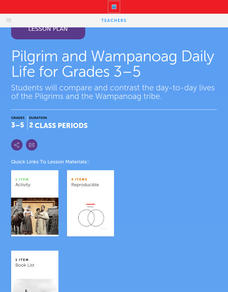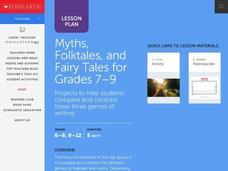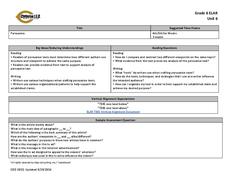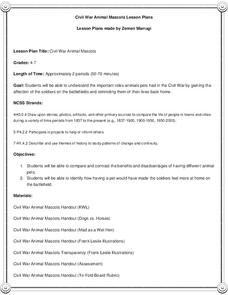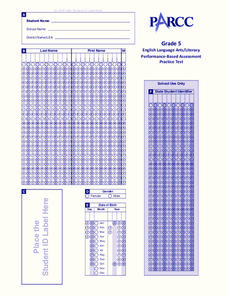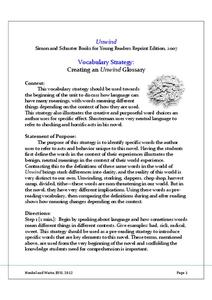Curated OER
Applying Ahimsa to Traditional Stories
Investigate the life of Mahatma Gandhi by researching non-violent lifestyles. Learners define the word ahimsa and discuss the personal characteristics that made Gandhi a peaceful warrior. They also create a poster about the story "The...
Scholastic
Pilgrim and Wampanoag Daily Life for Grades 3-5
Thirteen steps make up a lesson that challenges pupils to compare and contrast the daily lives of Pilgrims and the Wampanoag tribe. Learners revisit the Graffiti Wall then break into small groups for an investigative reading assignment...
Scholastic
Myths, Folktales, & Fairy Tales for Grades 7-9
Here is a must-have resource for studying fairy tales, myths, and folktales with your class! It includes instructional ideas, activities, and materials to support a month-long review of these three unique genres of writing.
Utah Education Network (UEN)
8th Grade Poetry: Sonnet Poem
The third lesson of five in an eighth-grade poetry unit has young scholars comparing Shakespearean sonnets with Petrarchan sonnets. To begin, they examine the different structures of the two forms and their different rhyme schemes. After...
Scholastic
Pilgrim and Wampanoag Daily Life for Grades 6–8
Two slide shows, viewed side-by-side, permit middle schoolers to compare and contrast the lives of the Pilgrims of the Plimoth colony and the Wampanoags. Four videos take learners on virtual field trips to the Plymouth plantation. And an...
Utah Education Network (UEN)
7th Grade Poetry: Ode Poem
Walt Whitman's "Captain, My Captain" and Robert Frost's "The Road Not Taken" provide seventh graders with examples of odes. After reading and discussing these and other examples, young poets craft an ode and respond to the ode of a...
EngageNY
Building Background Knowledge: Jigsaw to Build and Share Expertise about the 2010 Haiti Earthquake, Part 2
Calling all experts! Using the educational resource, pupils work together in small expert groups, reading an article about the 2010 Haiti earthquake. As they read, they record two main ideas and supporting details from the text.
EngageNY
Notices and Wonders of the Second Stanza of “If”
Here is an instructional activity that asks pupils to analyze poetry and sparks discussion about two different types of texts: asking how is the poem, If by Rudyard Kipling alike and different from the story, Bud, Not Buddy by...
Cleburne Independent School District
Grade 6 English Language Arts and Readiness: Persuasive
What is the best way to compare and contrast viewpoints on the same topic? A persuasive writing unit plan addresses targeted skills, vocabulary, instructional strategies, and suggested resources that would be perfect for developing writers.
Scholastic
Pilgrim and Wampanoag Daily Life
A lesson looks at the Pilgrims and Wampanoag tribe during the first Thanksgiving. Scholars compare and contrast information presented by an online activity then discuss their findings. Learners examine the two group's daily routines and...
EngageNY
Inferring About Characters Based on How They Respond to Challenges (Chapter 4: "Los Higos/Figs")
How do you know what a character's personality is like if an author doesn't tell you? With a focus on character development in Esperanza Rising, pupils complete a jigsaw activity to analyze the actions of Mama, Abuelita, and Miguel. Once...
Civil War Trust
Civil War Animal Mascots
A pet can offer comfort, friendship, and loyalty in the most stressful of situations. Here is a lesson plan that explores the important role animals played during the Civil War. Class members read informative texts, complete a KWL chart,...
Peace Corps
Family
Family traditions are the focus of a instructional activity that explores the lives of children in India and those in your classroom. Scholars examine their own family roles and traditions, then respond to an informative text detailing a...
Texas Education Agency (TEA)
Byzantine Architecture
View Byzantine architecture from the comfort of your classroom. A PowerPoint presentation introduces important vocabulary terms and examples of Byzantine architecture in the ninth lesson plan of the 11-part series. A Jeopardy game...
Johnson County Community College
Treasured Stories by Eric Carle
Explore the works of Eric Carle with a set of four lessons focused around the stories, Brown Bear, Brown Bear, What Do You See?, Papa, Please Get the Moon For Me, and The Very Hungry Caterpillar. Young readers develop a storyboard,...
Curated OER
Poetry Comprehension: Alfred Noyes' "The Highwayman"
Eight questions regarding Alfred Noyes' poem "The Highwayman" assess comprehension; readers infer, recall details, summarize, draw conclusions, compare and contrast, and respond to literature. A clean, useful resource if this poem is on...
EngageNY
Writing, Critique, and Revising: Two-Voice Poems (Chapter 14: "Las Ucas/Grapes")
Continue work on the two-piece poem that compares two characters from Esperanza Rising. Give class members a few minutes to finish their drafts. After they have a complete product, model how to critique and edit the poems with one group....
Rainforest Alliance
Looking at Leaves
Discover the Colombian rainforest through a presentation that follows a young girl named Chayo. Chayo describes her daily life, exploring the rainforest filled with plants and animals. After getting to know Chayo, scholars go on a nature...
Reed Novel Studies
The Underneath: Novel Study
Do you have a place that makes you feel safe and secure? Ranger, a hound in The Underneath, finds his new friend, a calico cat, and her safe place—underneath a porch. Scholars complete sentences using vocabulary from the novel as they...
Stanford University
Ruby Bridges
A two-part lesson features Civil Rights hero, Ruby Bridges. Part one focuses on the heroic actions of Ruby Bridges then challenges scholars to complete a Venn diagram in order to compare themselves to her. Part two begins with a...
Reed Novel Studies
Theodore Boone - Kid Lawyer: Novel Study
A child lawyer is exactly what people need ... not! With the novel study for John Grisham's Theodore Boone: Kid Lawyer, pupils use their imaginations to create their own examples of sarcasm. They also research a chosen famous lawyer and...
Curated OER
Performance-Based Assessment Practice Test (Grade 5 ELA/Literacy)
Check in on the development of your fifth graders' reading and writing skills with this Common Core-designed assessment. Given a series of six reading passages ranging from narrative stories to informational texts, young learners answer...
Curated OER
Unwind: Vocabulary Strategy, Creating an Unwind Glossary
Prior to reading Unwind, Neal Shusterman's 2007 young adult science fiction novel, class members research the common definition of words drawn from the novel that will come to have a very different meaning to them as they are drawn into...
Novelinks
The Little Prince: Blooms’ Taxonomy Questions
Question what you read with a lesson based on Bloom's Taxonomy. As kids read The Little Prince by Antoine de Saint-Exupéry, they formulate questions with cues from a graphic organizer, and answer them to work on critical thinking skills.



